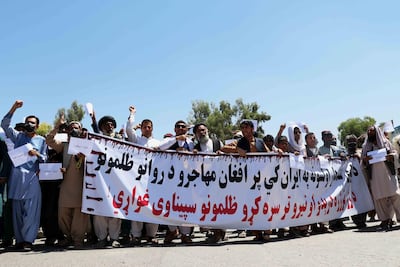Tension between the Afghan and Iranian governments escalated on Tuesday as Iran issued a warning to Kabul about the many protests taking place across the country and the Afghan diaspora over the killing of the three Afghan refugees by the Iranian police earlier this month.
“We have warned the Afghan ambassador in Tehran that such actions, insults and offences are intolerable,” Abbas Mousavi, the spokesman for Iran’s foreign minister, told reporters on Tuesday.
The diplomatic row erupted between the two neighbours following two incidents, only weeks apart, that resulted in the death and injury to Afghan refugees at the hands of the Iranian security forces.
In the most recent incident, on June 5, three Afghan migrants were killed in the Iranian province of Yazd when Iranian police shot their vehicle and it exploded.
Graphic videos of the victims burning and begging for water went viral across social media, evoking strong response from Afghans, many of whom shared their anger with the #IAmBurning hashtag in solidarity with the victims.

In May, Iranian police allegedly forced 45 Afghan refugees into a river as they tried to cross into Iran, where they drowned, according to Afghan politicians.
The Iranian government summoned Ghafoor Lewal, the Afghan ambassador to Iran, on Saturday, after several protests broke out across Afghanistan, including a large demonstration outside the Iranian embassy in the Afghan capital of Kabul. The protesters doused the embassy property in red paint to signify the blood of the victims.
“The Iranian regime is not only burning and drowning our youth but committing so many inhumane acts against Afghan asylum seekers. They even send our youth to fight their wars in Iraq and Syria. This is why we had to raise our voice against these injustices,” said Qubad, the culture affairs officer of the Solidarity Party of Afghanistan, one of the organisers of the protests.
Mr Qubad, who like most Afghans has only one name, was referring to the Fatemiyoun Brigade consisting of Afghan migrants and operated by Iran’s elite Quds Force, to fight alongside the Syrian regime.
“There is no accountability for their actions. The Iranian regime has continued to torture and harass the Afghans because they have always believed they can get away with it since our government is not strong,” he said.
The Afghan government has also faced backlash for what is perceived to be a lack of strict action against repeated incidents of torture against Afghan migrants in Iran.
Although the Afghan ambassador Mr Lewal, in his response, asserted the right of every Afghan citizen to protest peacefully, the Afghan government also promised to investigate the Afghan demonstrations, much to the disappointment of many Afghans.
Mr Qubad’s criticism of the Afghan government’s response resonated even within its own ranks. An Afghan official, speaking on the condition of anonymity, expressed similar frustration over the decision.
"What that regime does to Afghans is insane, cruel, very inhumane and shameful," the official told The National. The response from the Afghan government, he said, has also been very disappointing.
“If we can’t protect our people against suicide attackers, we can at least do things to protect them against the state tyranny.”
The Afghan government will be sending a high-ranking delegation to Iran next week led by Hanif Atmar, the acting foreign minister, “to find a suitable solution to solve the problems within the framework of mutual interests, maintaining friendship and expanding co-operation,” a statement said.
“Since our government is not elected by us, they do the bidding of others,” a disappointed Mr Qubad said.
Like many Afghans who’ve suffered decades of war, Mr Qubad too is familiar with the struggles and stigma of being an asylum seeker.
His outrage against the Iranian government is based on personal experiences as a refugee there during the years of civil war in his own country.
“If we had an independent country and a united government, we could’ve done through the diplomatic channels to seek justice,” he said. “But now that Iranian regime has so much influence in our country’s politics, how can we expect to get a result through diplomatic channels? We have to protest.”

